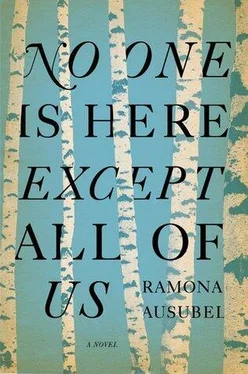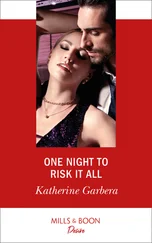All the ghosts wanted to do was bicker. “The new world,” they scoffed, while they noted the holes in the baker’s socks and the spiky slept-on hair of the banker’s children. “Doesn’t look like anything’s changed to us.” The ghost mothers sat at the bottoms of their living children’s beds and cleaned their nails. “Are you going to do those dishes in the morning, or is that unnecessary now in the new world?” they asked while their offspring tossed in their sleep.
“At least we realized when it was time for a new beginning,” we whispered. The ghosts were silent and, we were certain, smug. “Stop acting like you know something!” we said. We felt them smile down at us. “Ugh!” we cried.
The stranger waited for her own ghosts to arrive. Her children, a hundred times over. Each version of themselves — three days old, two years, three and a half, six. She imagined them all standing over her, their porcelain skin broken only by the flush in their cheeks. They would be peaceful-looking, a kind of patience fallen around their shoulders like a shawl. “Hello,” they might say. “Hello Goodbye. Hello Goodbye.” They did not come, those ghosts. Were they angry for being invented out of the world? Did they want to help their mother survive, which was the hardest job of all? Much harder than dying? While the rest of the village was haunted and nagged, the stranger was left alone, stirred into the dark batter of night.
But the dream every single one of us had, and the one that broke our hearts, was not about death or destruction or anything momentous. It was this: a normal day, no new world, no new rules, just an unremarkable day. Nothing floated down the river. We drank some tea with our bread. Birds were singing, but we did not notice. Time was a river we were carried upon and neither the spring nor the mouth was visible. We had no reason to appreciate every single second of the day — we had no reason to do anything but sit and breathe.
In that dream, the world did not require us to turn it.
THE BOOK OF THE SECOND FLOOD
We were drenched, soaked, full of dirty water. As if the radio had made a hole in the roof of the world, and everything we had kept out for a time flooded back, a torrent. The streets were puddles. The puddles were ponds, the river was a gnash of toothy froth. And in the tall grass: frogs. As if they had been seeded there, as if the wheat had dropped these four-leggeds. The frogs were a thick, slimy lather over everything, and their song was so loud we could not hear one another’s words.
The chickens proved themselves tireless hunters of frogs. Soon the barn was empty of those slippery things and we took refuge there, gathering each evening to construct the heavens. The sky grew to cover everything we could reach while standing on chairs, and then, bit by bit, the places a ladder could take us.
As we worked, the butcher suddenly burst out, “The world was supposed to be designed to work perfectly. We made it exactly how we wanted it, and now it’s malfunctioning right under our noses!” The butcher’s face was splotchy and sweating.
Kayla threw her plaster spade onto the floor. “He’s right,” she said. “We wanted a new place, a quiet and safe and clean place. What was so difficult about that? Have we not earned it, have we not given up absolutely everything we had to make it possible?”
The stranger bit her lip. “It’s not going to be easy. You are doing your best, but you have to be patient.”
“But are you doing your best?” Kayla sniffed. Depending on how you looked at it, the stranger had either given up or gained more than anyone else. At first I had thought of her like a blown-egg shell, delicate and empty, but then I came to see that she was not breakable like that. She withstood storms, bowed in the wind. She was a weathervane, twisting in gusts and in breezes. I did not know if I admired her, or wanted to send her spinning in circles.
“Why did you bring that forbidden object into our barn?” the widow asked.
“She didn’t. I did,” the jeweler said.
The widow sulked in the corner with the goats, scraping their food around with her spade. The goats and the woman were a temperamental match. Regina ground a dry pile of anonymous poop into the floor with her boot.
The stranger praised the beautiful starry night we had created. She praised our efforts to make a bright place in darkness. “You have done so much,” she said.
The stranger had tried so hard to keep us from all the confusion, the unfairness, the sadness. “You are a mother, too,” I said, remembering it as the words left my mouth. Her eyes fell closed, sails losing their wind. “I mean to say that you are our mother,” but her dead children had already been invoked.
“You won’t be surprised by this, but I’m tired,” Igor said. He sat down cross-legged and held his head.
While our minds bit and spit, our hands were busy cementing pieces of broken plates to the wall of the barn, and our sky grew around us, each neighborhood of stars, each tile, a dream of peace and silence. Our hands believed in heaven even while our minds panned for catastrophes. Our hands were first to forgive.
“It was belief in, not against, something — that made the world new,” the stranger said, reminding herself as much as anyone. She suggested we go around and say the names of the constellations we were working on — the sheep, the goat — to each of which we had given a meaning: the horse, which oversees the birth of babies; the pine tree, which keeps watch over men who can’t sleep; the potato, which looks after those who fear being alone. The frog, which must have some purpose, and the chicken, which pecks the frog.
We told the stories of our lives and made stars for each of the parts: a star for the day we saw our wives first; a star for the first day we held our mother’s hand for her sake and not our own; a star for the day the rain came under the doors and each man in each house thought he was going to be the hero, that when he went to his window he would find the rest of the buildings gone, having floated away, and only his own turned into a boat.
The greengrocer’s wife opened several jars of fruit canned many summers ago. We ate it by the light of our lanterns, the apricots sweet and slippery on our tongues.
While we licked the juice off our fingers, people suggested many honorable names for my baby. Saul and David. Strong-sounding names like Gregor and Ivan and Radu. I did not like any of these. I said I already had one king, and two only meant fights. I said strong was fine, but I wanted better than that. So they suggested beautiful names like Florian for flower and Aster for star . But I told them to be patient — surely he would tell us his name when he was ready. “Call him whatever you like, he will still be himself,” I said. The villagers looked to Igor in case he was more logical, but he had ceded all authority to me by falling asleep at my feet.
Every family I had ever been part of was in that room. It made my skin itch. The Lena I was when I was six in a houseful of cabbages and the Lena I was when I was growing at the rate of a year every few weeks with Kayla and Hersh and the Lena I was when I became a mother were people who might not have easily understood each other.
Time outside crashed away, beating the earth and emptying the sky.
And then, just like that, the seal of quiet broke and we heard a series of huge crashes outside the barn. We heard knocking on doors of the houses nearby. We went quiet. I wished I had more hands, enough to hold my boys and Igor, who slept soundly by my side. We all opened our eyes wider, as if we might be able to see through the walls. A group of three men in uniform threw the heavy doors open and looked around. For a long moment, the soldiers scanned the room, face by face, a black pistol in each of their hands. They looked in my direction and began to laugh, which was a language we understood.
Читать дальше












